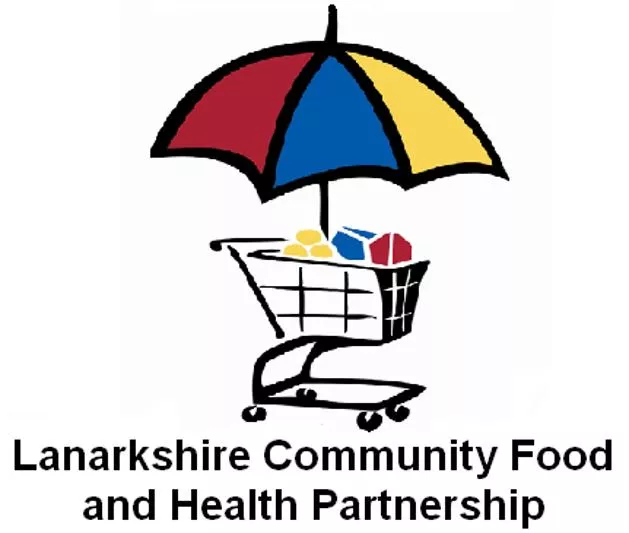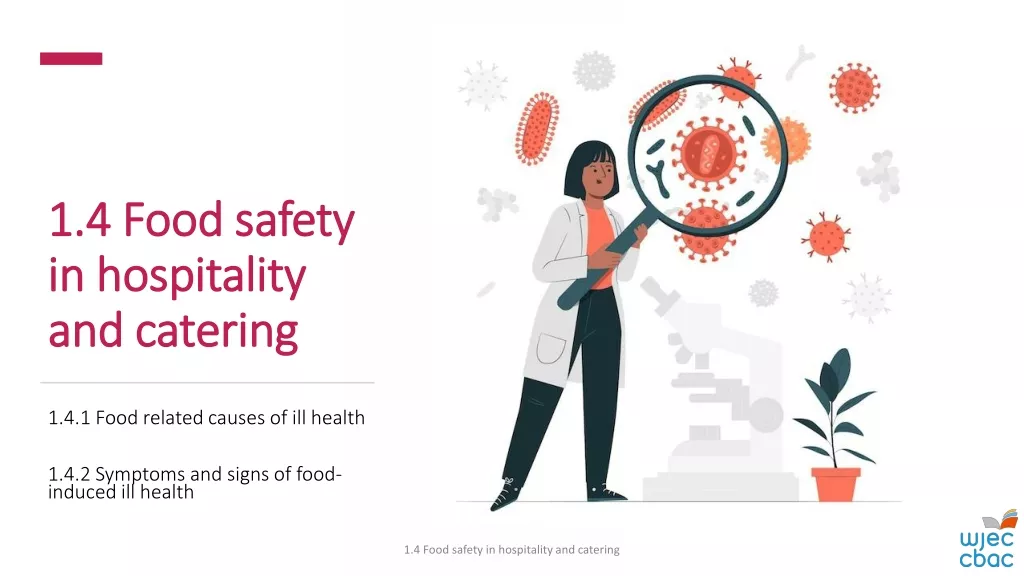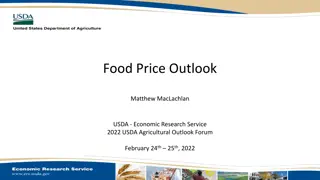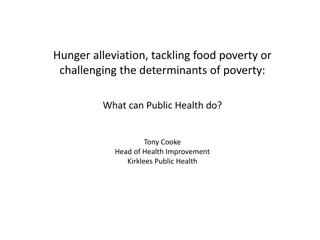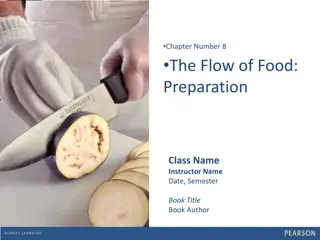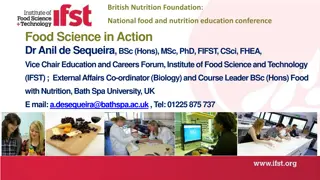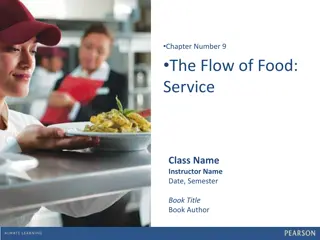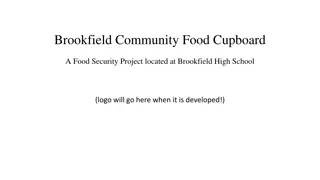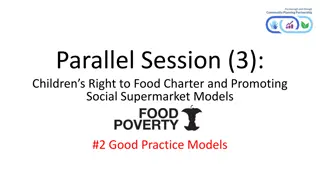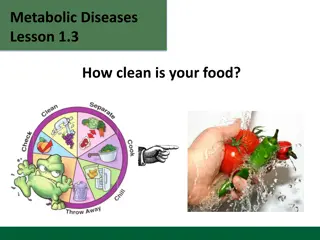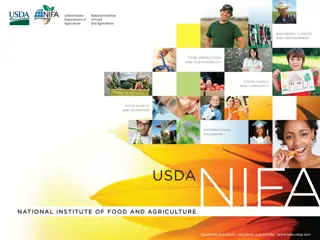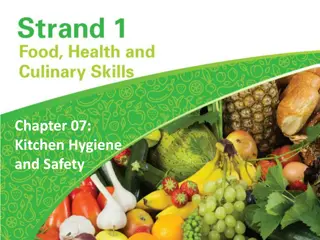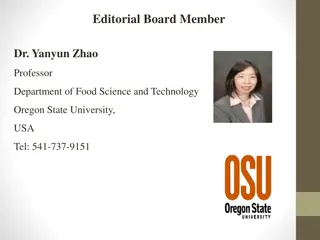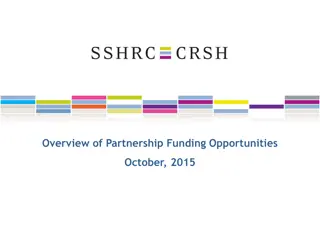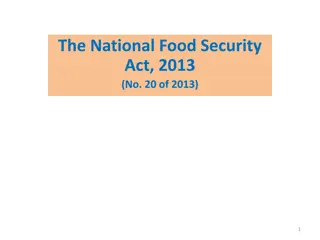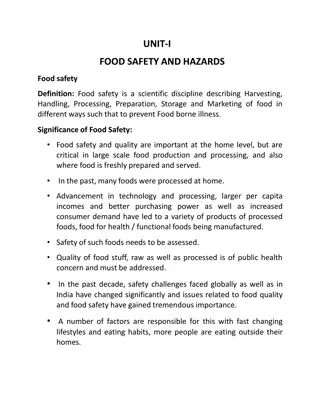Lanarkshire Community Food & Health Partnership Overview
Lanarkshire Community Food & Health Partnership is a registered charity founded in 1990, focusing on promoting health and nutrition through various programs. They offer workshops, cooking classes, and support for different groups, including perinatal mothers and families. With a staff of full-time and part-time members, they aim to provide accessible, affordable, and skills-based nutrition education to the community.
Download Presentation

Please find below an Image/Link to download the presentation.
The content on the website is provided AS IS for your information and personal use only. It may not be sold, licensed, or shared on other websites without obtaining consent from the author. Download presentation by click this link. If you encounter any issues during the download, it is possible that the publisher has removed the file from their server.
E N D
Presentation Transcript
LANARKSHIRE COMMUNITY FOOD & HEALTH PARTNERSHIP M A N A G E R : G O R D O N T H O M S O N P R O J E C T C O O R D I N A T O R : C L A I R E M O O N E Y
OVERVIEW Background of LCFHP Diabetes overview LCFHP course results A&Qs Group workshops three questions
LCFHP BACKGROUND LCFHP is a Company Limited by Guarantee and a Registered Charity in Scotland Founded as North Lanarkshire Food Federation 1990 Run by a network of community groups. The organisation is based in Bargeddie, North Lanarkshire
LCFHP SCALE 13 Full Time members of staff and 12 part time Office (300m sq ft) Warehouse (1000sq ft) 5 Delivery vans Turnover 2017/18 circa 850,000 (of which S.E. + trading approx 350,000) In 2017/18 LCFHP delivered 894 Nutritional workshops to over 14400 participants
LCFHP PROGRAMMES 1. Health and Social Care Integration: North Lanarkshire s Thematic Lead for Food in Third Sector H&SC Pathway 2. High Five for Fruit: Nursery Children eat 40% more Fruit and Veg than national average. Free fruit to 137 nurseries and Big Chef Little Chef sessions. 3. Healthy Mummy Happy Baby: Nutritional and lifestyle support for perinatal and post partum mothers 4. Club365: Holiday Hunger provision during school holidays. Over 10000 meals provided so far in 2018. 5. Make Move Munch Clubs: Family based programme to reduce health inequalities in areas of deprivation, families eat better and become more active whilst reducing food budget. 6. Community retailing: Fruit barras, support to over 200 healthy eating projects
LCFHP PHILOSOPHY PROVIDE AND PROMOTE Availability (Range) Accessibility (Circumstances and Where to buy) Affordability (Cost and Quality) Aptitude (Skills to prepare/cook) Attitudes (Cultural context/familiarity)
HEALTHY COOKING & NUTRITION CLASSES LCFHP employ 6 nutritionists to deliver a range of nutrition and cooking sessions. We ran 894 sessions last year with 14400 attendees. Modules include Tailored courses for conditions such as diabetes Nutrition through the lifecycles e.g. young families to older people Cooking using local/seasonal produce and menu planning for health Understanding food labels Fat, Salt and sugar Basic Nutrition Supports other community based cooking initiatives via the Training the Trainer programme in North Lanarkshire Accredited REHIS provider
HEALTH AND SOCIAL CARE HEALTH AND SOCIAL CARE INTEGRATION PROJECT INTEGRATION PROJECT What is diabetes? Diabetes mellitus is defined as a metabolic disorder characterised by chronic hyperglycaemia with disturbances in metabolism resulting from defects in insulin secretion, insulin action, or both (SIGN, 2010) Type 1 Diabetes (autoimmune disease) Type 2 Diabetes (lifestyle factors & genetics) Pre-diabetes (the stage before Type 2)
THE WORLD HEALTH ORGANIZATION THE WORLD HEALTH ORGANIZATION DIAGNOSTIC: DIAGNOSTIC: TABLE 1: TABLE 1: ORAL GLUCOSE TOLERANCE TEST (OGTT) Diagnosis Venous Plasma Glucose mmol/l Fasting 2 Hrs post glucose load Normal <6.0 <7.8 Diabetes Mellitus >7.0 >11.1 Impaired Glucose Tolerance (IGT) <7.0 >7.8 and <11.1 Impaired Fasting Glycaemia (IGT) >6.1 and <7.0 <7.8
CURRENT FIGURES IN SCOTLAND 291,981 people in Scotland have diabetes (Dec 2016) That is 7859 more than at end of 2015 (about 22 new cases/day) 5.4% (1 in 20) of the population have diabetes 0.7% of the population estimated to have undiagnosed diabetes The number of people with diabetes in Scotland is increasing at a rate of around 2.8% per year Diabetes accounts for 10% of all NHS expenditure. Latest Scottish Diabetes Survey www.diabetesinscotland.org.uk/Publications Latest figures from Scottish Diabetes Survey 2016
PROPORTIONS OF DIABETES IN SCOTTISH POPULATION ? ? Other Types Diabetes 1% 11% 88%
PROPORTIONS OF DIABETES IN SCOTTISH POPULATION Type 1 Type 2 Other Types Diabetes 1% 11% 88%
NHS SPENDING ON DIABETES NHS spending on diabetes 'to reach 16.9 billion by 2035' A new report published in the journal Diabetic Medicine has projected that the NHS s annual spending on diabetes in the UK will increase: From 9.8 billion to 16.9 billion over the next 25 years. NHS would be spending 17% of its entire budget on the condition. The Impact Diabetes report also suggests that the cost of treating diabetes complications is expected to almost double from the current total of 7.7 billion to 13.5 billion by 2035/6.
HEALTH AND SOCIAL CARE INTEGRATION PROJECT HEALTH AND SOCIAL CARE INTEGRATION PROJECT LCFHP Address Diabetes at a Community Level. Delivered three tailored courses targeting Diabetes and Behaviour Change in partnership with stakeholders (see handout) Number of participants: 20 adults (6 adults had a slight to moderate learning disabilities, some attended with support workers, referrals from Occupational therapist (OT). Pre-diabetes = 12 people Type 2 Diabetes = 8 people Multiple Long-Term Conditions (LTCs) = 15
LCFHP ADDRESS DIABETES AT A COMMUNITY LEVEL A review of the current services in North Lanarkshire: Diabetes Self-Management Type 2 Education Programme (STEP) Pre-Diabetes programme in Cumbernauld that has been running for around ten years. Weigh to go at Sports Centres (weight management programme) Neither of these included healthy cooking, which is an important factor for health and life skills. It was also highlighted that there was a gap in services for people with pre-diabetes based on consultations with NHS Lanarkshire specialist diabetes team Cooking is a non-threatening activity Some people prefer to be shown, rather than given a leaflet Peer-support within the classes
COURSE 1 :HEALTHY COOKING AND NUTRITION COURSE HEALTHY COOKING AND NUTRITION COURSE Tailored Cooking Carers Services Health Outcomes Tailored Nutrition AH Pathway & Walking Groups
COURSE 2: HELP YOURSELF TO BETTER HEALTH COURSE 2: HELP YOURSELF TO BETTER HEALTH Tailored Cooking Carers Services & VANL Tailored Nutrition Health Outcomes Telehealth (text messages) Chair Exercisers (2 tasters)
COURSE 3: HEALTHY LIFESTYLE COURSE COURSE 3: HEALTHY LIFESTYLE COURSE Tailored Cooking Carers Services Tailored Nutrition Health Outcomes One-to- one support Circuits Training (30mins) Telehealth (text messages)
METHODS The data was collected using questionnaires, nutritional quizzes and observations recorded by facilitators during the classes. The data was recorded on a locality template for outcomes and shared with partners. The Eatwell Guide was delivered as a general guide to healthy eating. Recipes were colour coded to match each segment of the Eatwell Guide, for example, green represents fruit/vegetables and yellow represents starchy carbohydrates. Portion size of food groups were consistently highlighted for energy balance and/or weight management. For those requiring weight management advice, a higher proportion of non-starchy vegetables was encouraged, and plates were provided from Diabetes UK. See illustration.
CHART 1: REFERRALS CHART 1: REFERRALS 9 8 8 7 No of Referrals (n=20) 6 6 6 5 4 3 2 1 1 0 NHS: OT Team NHS: Diabetes Team 3rd Sector & Community Groups CLD
RESULTS CHART 2: BODY WEIGHT CHART 2: BODY WEIGHT Body Mass Index (kg/m ) 14 12 Pre course Post course No of particpants (n=20) 12 10 8 8 6 6 6 4 4 2 2 2 0 0 Healthy weight (18.5-25 kg/m ) Overweight (25-30 kg/m ) Obese (30-35 kg/m Moderately) Obese (35> kg/m Severely) BMI Categories
CHART 3: DIETARY GUIDELINES AND KNOWLEDGE CHART 3: DIETARY GUIDELINES AND KNOWLEDGE Knowledge (Ave Score) 9 8 8 7 6 Scores 0-10 5 4 4 3 2 1 0 Pre-course results Post course results
CHART 4: PREPARING MEALS AND COOKING CHART 4: PREPARING MEALS AND COOKING How do you prepare meals? 25 Pre course results Post course results 20 20 20 18 15 No of participants (n=20) 15 10 10 9 5 5 3 0 Prepare dishes from scratch Put together ready-made ingredients eg. ready-made sauce to create a meal Cooked convenience foods or ready meals Buy take-aways or any fast food
CHART 5: FRUIT AND VEGETABLE CONSUMPTION CHART 5: FRUIT AND VEGETABLE CONSUMPTION Fruit & Veg Consumption 3.5 3 Porstion per day 2.5 2 1.5 1 0.5 0 Fruit per day Veg per day Pre course (average portion) Post course (average portion)
CHART 6: PHYSICAL ACTIVITY CHART 6: PHYSICAL ACTIVITY How often do you exercise? 18 16 15 No of particpants (n=20) 16 14 12 10 8 6 4 4 2 2 1 2 0 Never Once per week Twice per week Pre course (particpants frequency) Post course (participants frequency)
SUMMARY Obesity and Diabetes is a serious public health issue. Case Studies (see handout) All groups knowledge of healthy eating improved (e.g. free sugars, fats and salt recommendations) based on test scores and comments within the class. Over ten weeks two participants lost a stone and others lost four to six pounds in body weight achieving 5-10% weight loss. The participants activity levels increased significantly which was achieved by a combination of interventions that promoted weight loss among other health benefits. People were cooking foods using healthier methods and eating and drinking more desirably compared to pre-course data. In addition, their knowledge, understanding and skills improved over time. As a group, they felt less lonely and enjoyed the social element of the classes. The nature of the course was flexible and person-centred in order to achieve better outcomes for the participants this was an extremely successful approach for these groups.
THANK YOU FOR LISTENING! Questions?
WORKSHOPS 1. How do we increase referrals from clinician teams? 2. How do we mainstream courses to make them more sustainability? 3. Recommendations for future courses? Eg. Provide one-to-one support pre-course for example, a consultation before the course starts to discuss barriers and motivations. By using motivational interviewing techniques and goal setting to help keep people on track.
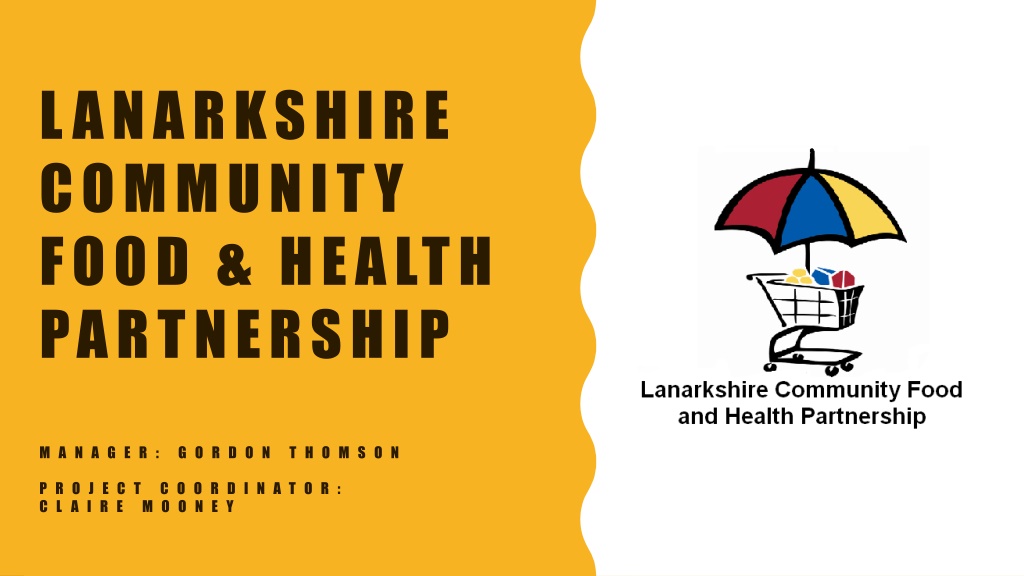
 undefined
undefined



